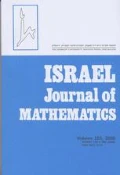Abstract
A dependent theory is a (first order complete theory) T which does not have the independence property. A major result here is: if we expand a model of T by the traces on it of sets definable in a bigger model then we preserve its being dependent. Another one justifies the cofinality restriction in the theorem (from a previous work) saying that pairwise perpendicular indiscernible sequences, can have arbitrary dual-cofinalities in some models containing them. We introduce “strongly dependent” and look at definable groups; and also at dividing, forking and relatives.
Similar content being viewed by others
References
Y. Baisalov and B. Poizat, Paires de structures o-minimales, Journal of Symbolic Logic 63 (1998), 570–578.
B. Baizhanov, J. Baldwin and S. Shelah, Subsets of superstable structures are weakly benign, Journal of Symbolic Logic 70 (2005), 142–150, math.LO/0303324.
J. T. Baldwin and M. Benedikt, Stability theory, permutations of indiscernibles, and embedded finite model theory, Transactions of the American Mathematical Society 352 (2000), 4937–4969.
M. Cohen and S. Shelah, Stable theories and representation over sets, preprint.
W. W. Comfort, Ultrafilters: some old and some new results, Bulletin of the American Mathematical Society 83 (1977), 417–455.
E. Firstenberg and S. Shelah, Pseudo unidimensional dependent theories. For more information please contact the author.
J. H. Keisler, Measures and forking, Annals of Pure and Applied Logic 34 (1987),119–169.
B. Poizat, Théories instables, Journal of Symbolic Logic 46 (1981), 513–522.
S. Shelah, Finite diagrams stable in power, Annals of Mathematical Logic 2 (1970), 69–118.
S. Shelah, Simple unstable theories, Annals of Mathematical Logic 19 (1980), 177–203.
S. Shelah, Classification theory and the number of nonisomorphic models, in Studies in Logic and the Foundations of Mathematics, vol. 92, North-Holland Publishing Co., Amsterdam, xxxiv+705 pp., 1990.
S. Shelah, Classification theory for elementary classes with the dependence property — a modest beginning, Scientiae Mathematicae Japonicae 59,No. 2; (special issue: e9, 503–544) (2004), 265–316, math.LO/0009056.
S. Shelah, Minimal bounded index subgroup for dependent theories, Proceedings of the American Mathematical Society 136 (2008), 1087–1091.
S. Shelah, Stable frames and weight.
S. Shelah, Strongly dependent theories, submitted.
S. Shelah, Dependent T and Existence of limit models, preprint, math. LO/0609636.
S. Shelah, Definable groups for dependent and 2-dependent theories, submitted.
S. Shelah, Dependent theories and the generic pair conjecture, Communications in Contemporary Mathematics, submitted, math.LO/0702292
S. Shelah, A dependent dream and recounting types, preprint.
S. Shelah, Toward the main gap by fatness, a modest beginning.
S. Shelah, Representation over orders of elementary classes.
S. Shelah, On incompctness in singulars (for Ext, consistently incompact).
Author information
Authors and Affiliations
Corresponding author
Additional information
The author would like to thank the Israel Science Foundation for partial support of this research (Grant No. 242/03). Publication 783.
I would like to thank Alice Leonhardt for the beautiful typing. Received June 18, 2004 and in revised form October 5, 2006
Rights and permissions
About this article
Cite this article
Shelah, S. Dependent first order theories, continued. Isr. J. Math. 173, 1–60 (2009). https://doi.org/10.1007/s11856-009-0082-1
Received:
Revised:
Published:
Issue Date:
DOI: https://doi.org/10.1007/s11856-009-0082-1


